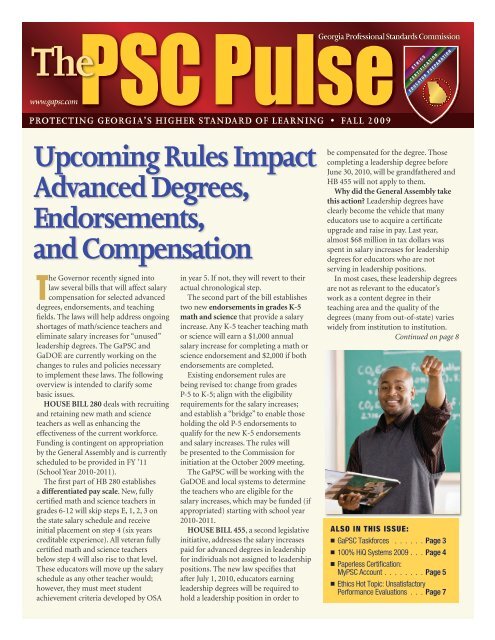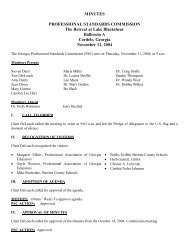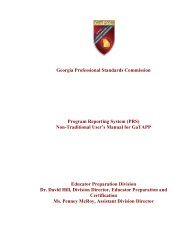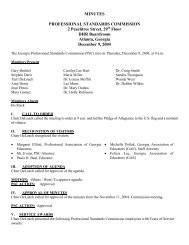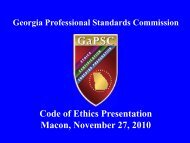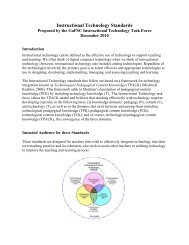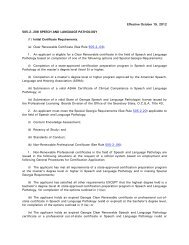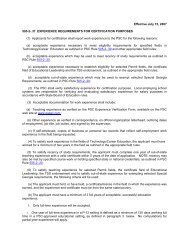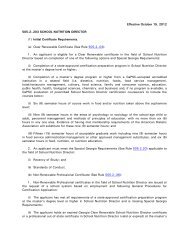Upcoming Rules Impact Advanced Degrees ... - GaPSC
Upcoming Rules Impact Advanced Degrees ... - GaPSC
Upcoming Rules Impact Advanced Degrees ... - GaPSC
You also want an ePaper? Increase the reach of your titles
YUMPU automatically turns print PDFs into web optimized ePapers that Google loves.
ThePSC<br />
Pulse<br />
www.gapsc.com<br />
PROTECTING GEORGIA’S HIGHER STANDARD OF LEARNING • FALL 2009<br />
<strong>Upcoming</strong> <strong>Rules</strong> <strong>Impact</strong><br />
<strong>Advanced</strong> <strong>Degrees</strong>,<br />
Endorsements,<br />
and Compensation<br />
The Governor recently signed into<br />
law several bills that will affect salary<br />
compensation for selected advanced<br />
degrees, endorsements, and teaching<br />
fields. The laws will help address ongoing<br />
shortages of math/science teachers and<br />
eliminate salary increases for “unused”<br />
leadership degrees. The <strong>GaPSC</strong> and<br />
GaDOE are currently working on the<br />
changes to rules and policies necessary<br />
to implement these laws. The following<br />
overview is intended to clarify some<br />
basic issues.<br />
HOUSE BILL 280 deals with recruiting<br />
and retaining new math and science<br />
teachers as well as enhancing the<br />
effectiveness of the current workforce.<br />
Funding is contingent on appropriation<br />
by the General Assembly and is currently<br />
scheduled to be provided in FY ’11<br />
(School Year 2010-2011).<br />
The first part of HB 280 establishes<br />
a differentiated pay scale. New, fully<br />
certified math and science teachers in<br />
grades 6-12 will skip steps E, 1, 2, 3 on<br />
the state salary schedule and receive<br />
initial placement on step 4 (six years<br />
creditable experience). All veteran fully<br />
certified math and science teachers<br />
below step 4 will also rise to that level.<br />
These educators will move up the salary<br />
schedule as any other teacher would;<br />
however, they must meet student<br />
achievement criteria developed by OSA<br />
in year 5. If not, they will revert to their<br />
actual chronological step.<br />
The second part of the bill establishes<br />
two new endorsements in grades K-5<br />
math and science that provide a salary<br />
increase. Any K-5 teacher teaching math<br />
or science will earn a $1,000 annual<br />
salary increase for completing a math or<br />
science endorsement and $2,000 if both<br />
endorsements are completed.<br />
Existing endorsement rules are<br />
being revised to: change from grades<br />
P-5 to K-5; align with the eligibility<br />
requirements for the salary increases;<br />
and establish a “bridge” to enable those<br />
holding the old P-5 endorsements to<br />
qualify for the new K-5 endorsements<br />
and salary increases. The rules will<br />
be presented to the Commission for<br />
initiation at the October 2009 meeting.<br />
The <strong>GaPSC</strong> will be working with the<br />
GaDOE and local systems to determine<br />
the teachers who are eligible for the<br />
salary increases, which may be funded (if<br />
appropriated) starting with school year<br />
2010-2011.<br />
HOUSE BILL 455, a second legislative<br />
initiative, addresses the salary increases<br />
paid for advanced degrees in leadership<br />
for individuals not assigned to leadership<br />
positions. The new law specifies that<br />
after July 1, 2010, educators earning<br />
leadership degrees will be required to<br />
hold a leadership position in order to<br />
be compensated for the degree. Those<br />
completing a leadership degree before<br />
June 30, 2010, will be grandfathered and<br />
HB 455 will not apply to them.<br />
Why did the General Assembly take<br />
this action? Leadership degrees have<br />
clearly become the vehicle that many<br />
educators use to acquire a certificate<br />
upgrade and raise in pay. Last year,<br />
almost $68 million in tax dollars was<br />
spent in salary increases for leadership<br />
degrees for educators who are not<br />
serving in leadership positions.<br />
In most cases, these leadership degrees<br />
are not as relevant to the educator’s<br />
work as a content degree in their<br />
teaching area and the quality of the<br />
degrees (many from out-of-state) varies<br />
widely from institution to institution.<br />
Continued on page 8<br />
Also in this issue:<br />
■ <strong>GaPSC</strong> Taskforces Page 3<br />
■ 100% HiQ Systems 2009 Page 4<br />
■ Paperless Certification:<br />
MyPSC Account Page 5<br />
■ Ethics Hot Topic: Unsatisfactory<br />
Performance Evaluations Page 7
2 • P S C P U L S E<br />
F r o m T h e e x e c u T i v e S e c r e T a r Y<br />
What you need to know<br />
With Phil Blackwell’s recent retirement, I<br />
want to formally welcome Jane Huntley<br />
as the new Director of Certification.<br />
Jane is well known to many of you through her<br />
excellent work in RESAs and through her role<br />
at the <strong>GaPSC</strong> in the early design of the Georgia<br />
Master Teacher Program.<br />
Federal Race to the Top (RTTT) Grant<br />
We are in the middle of a once-ina-lifetime<br />
opportunity to reshape the<br />
HENSON<br />
educational landscape in our state through<br />
the federal Race to the Top (RTTT) grant.<br />
In July 2009, the U.S. DOE published its draft eligibility and selection<br />
criteria for the $4.35 billion competitive grant. All Georgia state education<br />
agencies, under the direction of the Governor’s office, are working<br />
together to secure part of this funding.<br />
The grant mandates that state plans focus on four RTTT core reform<br />
areas: (1) Bolster standards and assessments; (2) Improve teacher and<br />
leader effectiveness; (3) Implement a statewide longitudinal data system<br />
using data to support instruction; and (4) Turn around struggling<br />
schools. Much of the <strong>GaPSC</strong>’s work focuses on the second reform area<br />
and involves such issues as alternative (non-traditional) programs,<br />
the effectiveness of teacher/principal preparation programs, equitable<br />
distribution of effective teachers, and specialized endorsements resulting<br />
in increased salary. The great news is that Georgia is well-positioned to<br />
compete. Additionally, the Bill & Melinda Gates Foundation has provided<br />
Georgia and 14 other states with funding to help guide us through the<br />
application process.<br />
RTTT applications must be submitted in December and the U.S. DOE<br />
is scheduled to announce the grant recipients in March 2010.<br />
The RTTT grant is part of the nearly $100 billion allotted to education<br />
in the American Recovery and Reinvestment Act of 2009 (ARRA). We are<br />
excited about the opportunity to compete in RTTT, and will provide you<br />
with updated information as it becomes available.<br />
HB 455/HB 280<br />
We continue our work to implement the recent HB 455 and HB<br />
280 legislation. The lead article in this issue provides information and<br />
clarification on these significant initiatives. If you have not yet read the<br />
HB 455 Guidance Document posted on our website, please visit<br />
www.gapsc.com. The return on investment from the K-5 Math and<br />
Science Endorsements created by HB 280, a teacher quality bill, could<br />
turn out to be the best piece of education legislation in the ’09 session.<br />
Sincerely,<br />
Kelly Henson, Executive Secretary<br />
The Georgia Professional Standards Commission<br />
Teacher<br />
recruitment an<br />
important focus<br />
Georgia is awarded $3.5 million<br />
grant from the U.S. DOE<br />
A<br />
sudden abundance of prospective teachers<br />
combined with budget cuts and furloughs makes<br />
it easy—but short-sighted—to reduce our efforts<br />
aimed at teacher recruitment. A recent <strong>GaPSC</strong> Best<br />
Practice conference focused on our recruitment,<br />
retention, and production of teachers.<br />
Why should we continue to focus on recruitment<br />
when we have minimal shortages and an ample pool of<br />
teachers in most areas? There are several reasons:<br />
■ The economy will rebound.<br />
■ Student growth will return to Georgia.<br />
■ Class sizes will return to lower numbers.<br />
■ Teachers will retire.<br />
■ Teachers will move to the private sector.<br />
■ There will be significant cost associated with teacher<br />
turnover.<br />
Some assistance with recruitment is already coming<br />
our way with the award of a five-year, $3.5 million<br />
Transition to Teaching Grant from the U.S. DOE. The<br />
2009-2014 grant will be used to place Math, Science,<br />
and Special Education Teachers in eligible “high-need<br />
schools.”<br />
One of only 14 national, state, or local grants selected<br />
from 90 qualifying proposals, the Georgia grant is the<br />
largest funding amount awarded.<br />
The federal Transition to Teaching Program<br />
facilitates teacher recruitment, selection, hiring and<br />
placement, as well as the support and retention of nontraditional<br />
candidates and teachers-of-record among<br />
career changers, paraprofessionals, and recent arts and<br />
science graduates.<br />
An Important Note on <strong>GaPSC</strong><br />
Customer Service<br />
Budget cuts are affecting all of us Vacant<br />
positions, especially in the areas of certification<br />
evaluation and ethics investigation, are slowing<br />
our productivity Like all of you, we are working<br />
hard, and yet trying to find ways to work smarter,<br />
to provide the best service to our customers
Taskforces convened to assist<br />
with rule and policy changes<br />
In order to facilitate continuous<br />
improvement, the Educator Preparation<br />
Division has convened a number of<br />
taskforces to recommend changes to the<br />
Commission that may result in new policies<br />
or new and revised rules.<br />
These taskforces are comprised of subjectmatter<br />
experts working in local school<br />
districts, Regional Educational Service<br />
Agencies (RESAs), or institutions of higher<br />
education, as well as representatives of other<br />
state agencies or organizations.<br />
Following initiation, rule changes are open<br />
for public comment for a period of 30 days<br />
before the Commission officially votes to<br />
adopt them.<br />
As of August 2009, five taskforces had been<br />
formed and another five will begin work in<br />
late fall 2009 or spring 2010. The work of each<br />
group is briefly described below.<br />
■ The K-5 Math and Science Endorsement Taskforce will make<br />
recommendations to bring the existing P-5 Math and Science<br />
Endorsement program rules into compliance with recent<br />
legislation (HB 280). In addition, the taskforce will recommend<br />
program delivery guidelines for program providers and will<br />
recommend methods for allowing previously endorsed educators<br />
to bridge, or convert, from the old endorsement to the new<br />
endorsement and become eligible for stipends. Anticipated date<br />
for initiating rule amendments: October 2009.<br />
■ The Distance Learning Taskforce will develop standards and<br />
processes for state approval of distance learning programs offered<br />
by in-state and out-of-state program providers. Anticipated date<br />
for initiating rule making: November 2009.<br />
■ The Teacher Leader Taskforce will develop new Teacher Leader<br />
standards and recommend changes to the existing endorsement<br />
preparation rule. Anticipated date for initiating rule making:<br />
January 2010.<br />
■ The Educational Leadership Taskforce will recommend<br />
amendments to the leadership rules to provide greater alignment<br />
between the preparation and certification rules, clarify ambiguous<br />
terms, remove dated phase-in components, and provide additional<br />
information regarding building level and district level preparation<br />
and certification options. Anticipated date for initiating rule<br />
amendments: TBD.<br />
P S C P U L S E • 3<br />
■ The Degree Equivalency Taskforce will review practices regarding<br />
the establishment of certification levels based on advanced<br />
degrees and recommend to the Commission a set of rules and/or<br />
guidelines for consistent and equitable decisions. Anticipated date<br />
for initiating rule amendments: TBD.<br />
■ The Science Education Taskforce will recommend changes to the<br />
Science Education (6-12) Preparation Rule to reduce the number<br />
and complexity of content standards and lessen the burden on<br />
program providers that offer broad field or multiple science field<br />
programs. It is expected that rule changes will encourage more<br />
providers to offer multiple science field programs. Anticipated<br />
date for initiating rule amendments: TBD.<br />
■ The Higher Education Opportunities Act (HEOA) Taskforce will<br />
assist <strong>GaPSC</strong> staff in redesigning <strong>GaPSC</strong> reporting requirements<br />
for all traditional and non-traditional providers of state teacher<br />
education programs in response to changes in federal reporting<br />
resulting from the re-authorization of the HEOA. Rulemaking not<br />
required.<br />
Additional taskforces are working on preparation standards in the<br />
areas of ESOL, Health and Physical Education, Special Education,<br />
and Educational Interpreter.
4 • P S C P U L S E<br />
100% HiQ Systems<br />
■ Banks County<br />
■ Barrow County<br />
■ Ben Hill County<br />
■ Berrien County<br />
■ Bryan County<br />
■ Charlton County<br />
■ Clarke County<br />
■ Cook County<br />
■ Decatur County<br />
■ Effingham County<br />
■ Elbert County<br />
■ Evans County<br />
■ Fayette County<br />
■ Floyd County<br />
■ Forsyth County<br />
■ Glascock County<br />
■ Habersham County<br />
■ Hancock County<br />
■ Harris County<br />
■ Jackson County<br />
■ Jasper County<br />
■ Jeff Davis County<br />
■ Jefferson County<br />
■ Lincoln County<br />
■ Madison County<br />
■ Miller County<br />
■ Monroe County<br />
■ Oconee County<br />
■ Pickens County<br />
■ Pierce County<br />
■ Pike County<br />
■ Rabun County<br />
■ Screven County<br />
■ Taliaferro County<br />
■ Tift County<br />
■ Toombs County<br />
■ Treutlen County<br />
■ Warren County<br />
■ Wheeler County<br />
■ Wilkes County<br />
■ Wilkinson County<br />
■ Bremen City<br />
■ Buford City<br />
■ Cartersville City<br />
■ Chickamauga City<br />
■ Pelham City<br />
■ Thomasville City<br />
Announcing 2009’s<br />
100 Percent Highly Qualified<br />
Systems and Schools<br />
The <strong>GaPSC</strong>, contracting with<br />
the GaDOE, provides technical<br />
assistance and monitoring services<br />
to school systems and schools to<br />
help assure teacher quality. The state<br />
Title II, Part A consultants and staff<br />
work to ensure all Georgia teachers<br />
and paraprofessionals in every core<br />
academic subject classroom are<br />
highly qualified and that all students<br />
have equal access to instruction by<br />
experienced and effective teachers.<br />
As part of this program, the <strong>GaPSC</strong><br />
has formed a Charter School Taskforce<br />
to assist school systems and charter<br />
schools in attaining 100 percent highly<br />
qualified status.<br />
The <strong>GaPSC</strong> is proud to announce<br />
the systems and schools that attained<br />
100 percent highly qualified status by<br />
June 30, 2009.<br />
The complete list of 100 percent highly<br />
qualified schools for 2009 is available at:<br />
www.gapsc.com/EducatorPreparation/<br />
NoChildLeftBehind/home.html<br />
Recent Educator Preparation Rule Changes<br />
Effective July 15, 2009:<br />
■ 505-3- 22 Healthcare Science and Technology Education Program<br />
■ 505-3- 49 School Nutrition Director Program<br />
Mark Your Calendar: University Certification/Program Officials<br />
Please mark your calendar and plan to join us on Wednesday, December 2, 2009, for the 16th Annual University<br />
Certification and Program Officials Conference at the Macon State College Conference Center The conference will begin<br />
at 9:00 a m and conclude by 3:30 p m<br />
Additional details and online registration information will be made available in early November
MyPSC Account is a step toward<br />
paperless certification<br />
As mentioned in the previous issue of<br />
the PSC Pulse, the <strong>GaPSC</strong> is moving to<br />
paperless certification. Beginning<br />
January 1, 2010, the <strong>GaPSC</strong> will no longer<br />
print and mail certificates and correspondence<br />
to educators. It will instead issue these<br />
documents electronically.<br />
Going paperless will have several<br />
important benefits. First, it will result in faster<br />
communications. You will no longer have to<br />
wait for delivery of your correspondence and<br />
certificate. Second, it is more convenient. You<br />
can access your certificate and correspondence<br />
anytime, anywhere. Third, going paperless<br />
will result in significant cost savings on<br />
paper, printing, envelopes, and postage. For<br />
educators, obtaining duplicate copies of your<br />
certificate is easy and free—simply print<br />
another copy when you need one.<br />
Your access to the paperless system will<br />
be through your “MyPSC Account.” Once<br />
implemented, individual accounts MUST<br />
be created by all certified Georgia educators,<br />
applicants for certification, and individuals<br />
who have taken the GACE but have not yet<br />
applied for certification. To view or print your<br />
certificate, or to read correspondence from<br />
the <strong>GaPSC</strong>, simply log in to your account.<br />
We will even notify you via email when new<br />
correspondence has been posted.<br />
The web portal is targeted to be available<br />
this November. Everyone will need to take a<br />
few minutes to create his or her account at<br />
that time. We will provide more details as we<br />
get closer to the implementation date.<br />
Please note these three very important points:<br />
P S C P U L S E • 5<br />
The new launch page for MyPSC will provide an easy and convenient way for you to access<br />
your certificate, check your status, and get the information you need when you need it<br />
■ Who must create a MyPSC Account? All certified Georgia educators, applicants for certification, and individuals who have taken the<br />
GACE but have not yet applied for certification.<br />
■ As part of the account creation process, it is critical you provide a valid email address. Since correspondence will be via email, you will<br />
need to use a reliable email address—one that you check often. To make sure we are able to reach you, you may enter a second, backup<br />
email address during the registration process. While providing a secondary email address is not required, we strongly recommend you<br />
do this. If your email address changes, you will need to update your MyPSC Account with the new address.<br />
■ You must have your certification ID number to create and log in to your account. Your six-digit certification number is your <strong>GaPSC</strong><br />
Account Number. This number is printed on your certificate and on correspondence from <strong>GaPSC</strong>. Please keep this number handy.
6 • P S C P U L S E<br />
Georgia master Teacher Program Launches<br />
applications for 2009-2010<br />
As the Georgia Master Teacher program moves into its fifth year, K-12 public school<br />
teachers are invited to apply for this recognition based on their impact on student<br />
achievement and progress. Applications in three categories — Instructional Coach,<br />
Core Curricular (CRCT) and Non-Core Curricular — are available on the Master Teacher<br />
website (www.gamasterteachers.org).<br />
The deadlines for application to the program are December 15, 2009 (CRCT) and<br />
January 31, 2010 (Non-CRCT and Instructional Coach).<br />
For current Master Teachers, specialized training in January 2010 will feature noted<br />
author and educator Jay McTighe presenting the workshop Understanding by Design<br />
and Differentiated Instruction. Jay is well known for his work with “thinking skills.”<br />
The training is offered with the support of the Professional Association of Georgia<br />
Educators (PAGE).<br />
recent certification rule changes<br />
Effective July 15, 2009:<br />
■ 505-2- 08 International Exchange Certificate<br />
■ 505-2- 70 Healthcare Science Technology Education Certificate<br />
■ 505-2- 203 School Nutrition Director<br />
Effective October 1, 2009:<br />
■ 505-2- 02 Classification: Category, Title, Type, Field, Level<br />
■ 505-2- 25 Add a Field to An Existing Certificate<br />
■ 505-2- 108 Special Education General Curriculum/Early Childhood Education (P-5)<br />
Effective October 15, 2009:<br />
■ 505-2- 15 Certification By Interstate Reciprocity<br />
DiD<br />
You<br />
KNoW<br />
?<br />
From July 1, 2006, through June<br />
30, 2009, the <strong>GaPSC</strong> processed<br />
5,714 upgrades based on advanced<br />
leadership degrees.<br />
In comparison, during the same period<br />
of time, upgrades were processed for<br />
advanced degrees in these majors:<br />
■ English 289<br />
■ Math 258<br />
■ Broad Field Science 85<br />
■ Music 168<br />
■ Early Childhood 2,164<br />
NOTE:<br />
As of June 30, 2009, just under 25%<br />
of those 5,714 educators obtaining<br />
leadership degrees were employed in<br />
a leadership position<br />
DiD You<br />
KNoW ThiS?<br />
In the last three months between July 1<br />
and September 30, the <strong>GaPSC</strong> received<br />
15,000 applications, completing 13,544<br />
of those application transactions As a<br />
result, Georgia has 3,797 newly certified<br />
educators and 2,495 educators with<br />
renewed certificates Other transactions<br />
included upgrades, conversions, and<br />
name changes<br />
During the same three months, the<br />
<strong>GaPSC</strong> Call Center processed 28,360<br />
telephone calls
Hot Topic:<br />
Unsatisfactory Annual<br />
Evaluation Requirements<br />
The <strong>GaPSC</strong> receives many questions each month about<br />
“Unsatisfactory Annual Performance Evaluations.” The laws, rules,<br />
and procedures related to this issue are included in the box below.<br />
Please review this information to assure that your school system is in<br />
compliance with the requirements. Superintendents should note<br />
that it is their responsibility to ensure that the information on<br />
unsatisfactory evaluations is provided to the <strong>GaPSC</strong> in an accurate<br />
and timely manner.<br />
“Unsat”-Related <strong>Rules</strong>, Laws, and Procedures<br />
<strong>Rules</strong><br />
DOE Rule 160-5-2-.04 (2) (a) 5<br />
Certified personnel shall not receive credit for any year of experience<br />
in which the individual received an unsatisfactory performance<br />
evaluation<br />
<strong>GaPSC</strong> Rule 505-2-.24 8.(a)<br />
For Clear Renewable or Performance-Based certificates that expire<br />
June 30, 2005, or after, an educator with two unsatisfactory annual<br />
performance evaluations during the previous five-year validity cycle<br />
that have not been satisfactorily remediated by the employing school<br />
system shall not be entitled to a renewable certificate in any field<br />
1 At the request of an employing Georgia school system, the individual<br />
may be issued a one-year non-renewable Waiver certificate<br />
During the validity period, the individual must demonstrate that the<br />
performance deficiency has been satisfactorily addressed as verified<br />
by the employer<br />
2 When the performance deficiency has been satisfactorily addressed<br />
and verified by the employer, the employing school system may apply<br />
for the appropriate renewable certificate The new, Clear Renewable<br />
certificate will be issued for four years to complete the established<br />
five-year cycle<br />
3 The <strong>GaPSC</strong> shall maintain a central clearinghouse of information<br />
on Georgia educators receiving annual unsatisfactory performance<br />
appraisals or annual performance remediation Each local school<br />
system is required to report this information on or before June 30 of<br />
the academic year in which the appraisal or remediation occurred<br />
The local system superintendent is responsible for ensuring this<br />
information is provided in an accurate and timely manner.<br />
Effective October 15, 2009:<br />
■ 505-6- 01 Code of Ethics for Educators<br />
P S C P U L S E • 7<br />
recent ethics rule changes<br />
Laws<br />
O.C.G.A. 20-2-200.(c)<br />
An individual who has received two unsatisfactory annual<br />
performance evaluations in the previous five-year period pursuant<br />
to Code Section 20-2-210 shall not be entitled to a renewable<br />
certificate prior to demonstrating that such performance<br />
deficiency has been satisfactorily addressed, but such individual<br />
may apply to the commission for a nonrenewable certificate<br />
O.C.G.A. 20-2-212.(a)<br />
The placement of teachers on the salary schedule shall be<br />
based on certificate level and years of creditable<br />
experience, except that a teacher shall not receive credit<br />
for any year of experience in which the teacher received an<br />
unsatisfactory performance evaluation<br />
Procedures<br />
Marking an Unsatisfactory Evaluation as REMEDIATED on<br />
the <strong>GaPSC</strong> Website:<br />
When the performance deficiency has been satisfactorily<br />
addressed and verified by the employer, the administrator at the<br />
local education agency (LEA) authorized to access the UNSAT<br />
box on www.gapsc.org can check the Remediated box on the<br />
educator’s UNSAT file<br />
Correcting an Erroneous Entry in the <strong>GaPSC</strong> Database:<br />
Submit a letter, hardcopy or electronic, from the superintendent<br />
to Mark Pevey (<strong>GaPSC</strong>, 2 Peachtree Street, Suite 6000, Atlanta,<br />
GA 30303 or mark.pevey@gapsc.com) explaining the error and<br />
requesting that the entry be changed
8 • P S C P U L S E<br />
<strong>Upcoming</strong> <strong>Rules</strong> <strong>Impact</strong><br />
<strong>Advanced</strong> <strong>Degrees</strong>, Endorsements,<br />
and Compensation<br />
(continued from front cover)<br />
Specific details, such as the definition of leadership degrees, leadership positions, and<br />
procedures for school systems to determine placement on salary schedules, are addressed in<br />
“HB 455 Guidelines,” available on the <strong>GaPSC</strong> website at www.gapsc.com.<br />
What’s next? HB 455 is a start on addressing “unused” degrees, but in actuality leadership<br />
degrees represent only the tip of the iceberg. Practically any advanced degree in virtually any<br />
other area currently results in a certificate upgrade. There is often no quality control on the<br />
program and no need for the degree to be relevant to the educator’s work.<br />
<strong>GaPSC</strong> is developing a new proposed rule with significant changes in certificate<br />
upgrades. Connecting degree majors with certification and job duties as part of the<br />
compensation process should enhance educator effectiveness, facilitate student achievement<br />
and school improvement, and provide a greater return on our investment in advanced<br />
degrees. Draft copies of the rule will be circulated for review and comment prior to taking<br />
the rule to the Commission.<br />
Protecting Georgia’s Higher Standard of Learning<br />
EE TT HH II CC SS<br />
CC EE RR TT II FF II CC AA TT II OO NN<br />
EE DD UU CC AA TT OO R R PP RR EE PP AA RR AA TT II OO NN<br />
Georgia Professional<br />
Standards Commission<br />
Two Peachtree Street, Suite 6000<br />
Atlanta, GA 30303-3141<br />
©2009 Georgia Professional Standards Commission<br />
Produced by A3 Creative Group, LLC (www.a3creativegroup.com)


